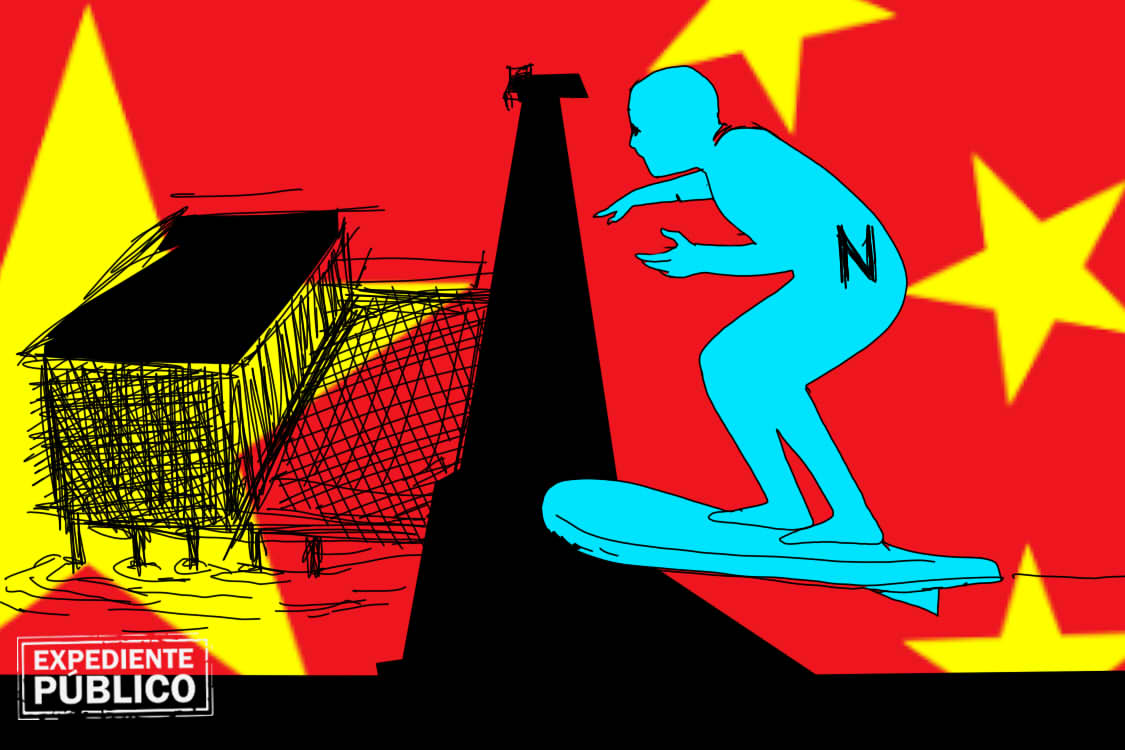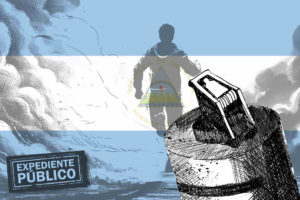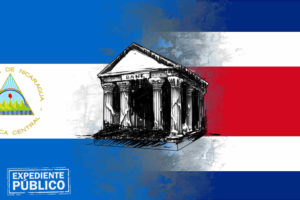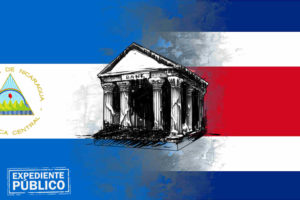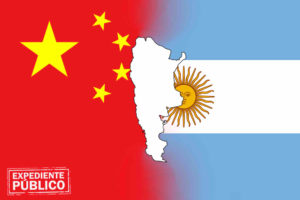*Of those working on the project, 90% are Chinese who are about to finish the construction that President Nayib Bukele is promoting at the Port of La Libertad.
**The information about all the agreements for the project valued at US$24 million is restricted material.
Eric Lemus / Expediente Público
The project will cost at least US$24 million. That is all that is publicly known about the wharf located 30 kilometers from El Salvador financed by the government of the People’s Republic of China under the shadow of secrecy.
Nayib Bukele’s government celebrated the installation of the last piling of the structure that supports the platform, which is 30 meters long and 15 meters wide and where the attraction will be a shopping mall.
During the last visit taken to the location during the week of July 24, 2023, two local fishermen who fish in the area explained to Expediente Público that the company removed most of its Chinese personnel after placing two cranes at the end of the ramp, which, they presume, will lift and unload the local boats that go to sea.
The fishermen, who requested that their names be omitted, say that some locals temporarily work there under strict Chinese supervision.
“We do not know anything because no one has spoken about the pay or otherwise,” said one of the fishermen.
Finishing touches on the building that will surround the commercial area have yet to be completed, however, the information about the launch of the project is just as secretive as the details of the Chinese donation itself, where the company, China Harbour Engineering Company Limited (CHEC Ltd.) was in charge.
Projects executed in secrecy
According to brief information published to social media on November 30, 2021, by the Chinese embassy in El Salvador, “China Harbour and Yanjian Group, respectively, are in charge of the construction of the Port of La Libertad and the National Library, which are megaprojects donated by China.”
Read: La falta de transparencia en construcción de biblioteca de cristal prometida a El Salvador por China
The company, unlike Xinjian Group, who is overseeing the construction of the library located in the historic center of San Salvador, did not put its name on any machinery at the project site while work began.
Unofficially, and according to their website, CHEC Ltd. is a Beijing-based contractor that operates as a subsidiary of China Communications Construction Company, which specializes in marine engineering; dredging and reclamation; and infrastructure, road and bridge, railway, airport, and machinery construction.
The pier is the second visible project of all the promises from the Chinese following Nayib Bukele’s trip to Beijing in December 2019.
According to the head of state, his Chinese counterpart, Xi Jinping also pledged US$500 million, which was non-reimbursable.
Since then, Salvadorians await the construction of a new soccer stadium, a library made of crystal, a refurbished wharf, and a water purification plant on a lake near the capital.
A project worth US$24 million
On March 19, 2023, the ministers of Public Works, Romeo Rodríguez, and Tourism, Morena Valdez, accompanied by Chinese personnel and a videography team, which captured the moment that was later published by the government on social media, supervised some important advances made to the wharf.
Once the supervision was taken care of, however, Minister Rodríguez said that the construction of the pier “is an investment of approximately US$24 million.”
“Through this project, jobs are being created because there are many Salvadorian families that are also working in the construction of this large infrastructure project,” added the official without any detailed information on the matter.
The execution of one of China’s many promises is characterized by the lack of a public report on the technicalities of the project, the lack of a study on the environmental impact of the project, and strict opacity, which is the norm for the government of Bukele.
Geostrategic importance
The now former Chinese ambassador in San Salvador, Ou Jianhong, tweeted in May 2021 that the people of El Salvador were the “main recipients of China’s non-reimbursable assistance.”
“China has never in the past nor will in the future use foreign assistance to interfere in the internal affairs of other countries, let alone for its own benefit,” he underlined.
Argentinian Marco González Gavá, who is an expert in economic analysis and Asian finance for the ReporteAsia portal, becomes more suspicious when he hears about Beijing’s presence in Central America.
“We have to remember the project One Belt, One Road or the maritime and silk road route because China has a maritime project to conquer the world, and the Caribbean is very important because of its proximity with the Panama Canal and its rising number of followers,” González Gavá tells Expediente Público.
Read: Bukele se traga el “cuento chino” de millonarias inversiones en El Salvador que nunca llegan
Win or lose
Rubén Zamora, former Salvadorian Ambassador in Washington, India, and before the United Nations, told Expediente Público that he is of the opinion that the Asian giant’s strategy “is to keep expanding to achieve its role as a large and powerful country.”
“We have to look at these things independently not only because of the type of expansionism that the Republic of China is pursuing but also because of the political interests that our country brings to the table,” alludes the former diplomat on the closeness of Bukele’s government to Beijing.
“Do we have something to gain, or, on the contrary, will we lose? Does it make sense to open up these spaces? We have to evaluate the relationship,” he suggests.
A forced destiny
The Ministry of Tourism (MITUR) reported that in the first semester of 2023, El Salvador reported US$1.667 million from earnings particularly based on visitors from the United States, Guatemala, and Honduras.
La Libertad is a recreation hub for tourists, which attracts more citizens and foreigners because it is just a few minutes away from the capital and hosts a food court that specializes in fish and seafood.
The infrastructure, which was designed and constructed as part of the Tourism Complex of La Libertad Port, was not financed by China but rather, through a loan granted in 2017 by the International Development Bank (IDB) of US$5,278,761.89.
The money was put to work during the administration of former President Salvador Sánchez Cerén, who governed between 2014 and 2019, but began operations as Market of the Sea in February 2020 under the mandate of Bukele.
The project constructed by China will be an extension of this vendor area.
The cultural legacy of a wharf
The construction of a first metal pier at La Libertad was inaugurated in December 1860 during the government of Francisco Dueñas, the same political leader who, a little more than a century and a half ago, founded the National Library, whose original bibliographic collection will end up in the new building that China is also constructing in the historic town center of the capital of San Salvador.
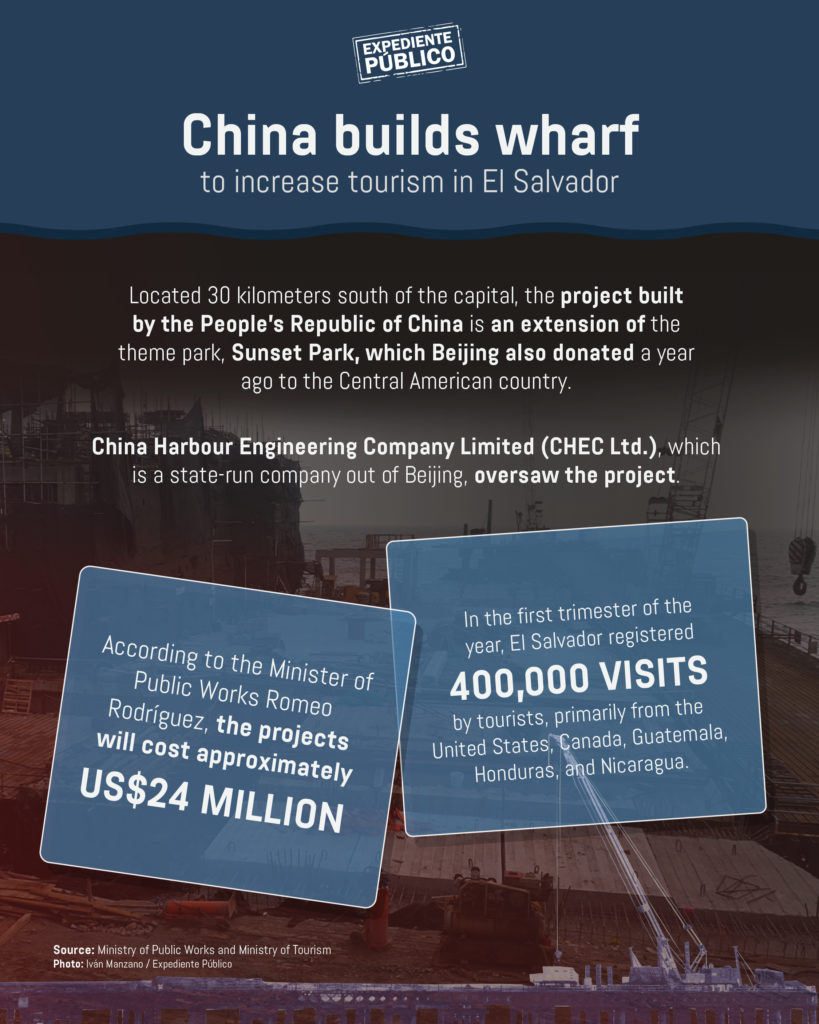
The old wharf is also protected as cultural patrimony due to the use of the port, which dates back to 1824, thanks to a decree issued by the Federal Congress of the Republics of Central America three years after the declaration of independence from the Spanish colony.
As time passed, this site was renovated until it was turned into a fishing pier, which has been used since the mid-1900s by local fishermen.
Up and down the platform, the docked boats exhibited their fresh fish to tourists that came and went from the open-air market. Now, that picturesque scene has disappeared because products should be sold at the Plaza Marinera.
China’s promises
In visiting the labor site, Expediente Público was only able to access the area that borders the food court because the entrance is blocked off with a fence that highlights the phrase, “Chinese assistance for a common future.”
The project consists of 129 columns that support a platform that is 30 meters long and 15 meters wide, where the construction of the headquarters of a shopping mall is promoted.
Eduardo Oviedo, professor at the National University of Rosario (UNR in Spanish) in Argentina, specializes in the geopolitical role that China plays in the 21st century and incorporates a strategic element.
“After having preyed on the South China Sea, China now looks for distant fishing opportunities,” he predicted in a conversation with Expediente Público.
Read: Índice de China revela los métodos de infiltración del gigante asiático en la sociedad
A harbor for entertainment
The launch of the Chinese project on Salvadorian waters will be an extension of a recreational park that opened in August 2022.
President Bukele came one night to inaugurate the site as the main attraction for those who arrived at the Port of La Libertad, where one can now find an area for rides, which is administered by an agency of the Ministry of Tourism.
“Sunset Park is the premier park of all the amusement parks pertaining to the Salvadorian Institute of Tourism, and we do not doubt that this wharf will be one of the most preferred both for domestic and international tourists,” Minister Valdez stated recently.
Napoleón Campos told Expediente Público, behind every action by the government, “I choose to talk about the Communist Party of China, which is the true actor in all of this, from those five mechanical wheels at the port to large projects and investments.”
On the other hand, a report issued by the Maritime Port Authority reported a flank suffered by this maritime area.
“From May 5 to May 2, there were heavy waves that affected the Salvadorian coastline, …reporting damages to the structures on the shoreline, particularly to the local fishing wharf,” reads the report, which alerts its readers to the threat of seasons of fast waves of up to 2.2 meters high with speeds of 60 kilometers per hour.
The third project
The immanent conclusion of projects for the wharf, which were the most recent donation from Beijing to Bukele, coincides with the arrival of the next objective of Chinese capital: the drilling of eight wells around Lake Ilopango, where there will be a potable water plant.
The President of the National Administrator of Aqueducts (ANDA), Rubén Alemán, limited himself to saying that the company, Hebei Construction Group International Engineering Company (HBCG International), will be in charge of the project to bring water to San Salvador, a city that already suffers from water shortages.
HBCG International was a provincial state-run company of the Department of Foreign Relations of the Engineering Office of Hebei Construction until 2014, when it became a company for the development of business abroad.
As reported on its website, it participates in various countries, such as Russia, Mongolia, Cambodia, Syria, Iraq, Ethiopia, Chad, Pakistan, Japan, Nigeria, Tanzania, Qatar, Venezuela, Liberia, Zambia, Jamaica, and Uzbekistan, «under the ‘Going Global’ Strategy.”
Beijing began this tactic in 1999 as an official policy to encourage Chinese investments abroad, according to the Organization for Economic Cooperation and Development (OECD).
This is China’s third promise to El Salvador following Bukele’s official visit to Beijing in 2018, when the head of state had just begun his mandate and had not yet stated his interest in reelection and extending his government for five more years.

